外研版英语高中二年级年级必修五重要知识点梳理
高中英语外研版必修五知识点

高中英语外研版必修五知识点关于任何事物的知识都有五个层次或者要素:事物的名称、定义、形象,有关事物的智识或者知识,以及事物本身——这才是知识的真正目标。
下面给大家提供一些高中英语外研版必修五知识,希望能够帮助大家,欢迎阅读!Module1重点短语:对某人来说,……是显然的和某人或某物有相同之处与……有很多共同之处与……没有/很少有共同之处做某事有些/很多困难做某事有一些/很多困难=announce to sb.sth 向某人宣布某事重点知识点:pare(v.)---parison(n.)把A和B比拟pare A with B把A比作/比喻为Bpare A to B比起…,与…相比(作状语)pared with /to比得上pare with无与伦比beyond parison与…比拟in parison相比之下by parisondiffer(vi)different(adj.)difference(n.)在…方面不同differin= be differentin区分…和…Tell the difference between…and..不同于differfrom= be differentfrom和某人在…方面differ with sb.on sth.有影响,使不同make adifference对…有影响have an effect on=have an influence on =affect =influenceItmakes a big differenceto your lifewhetheryou take an optimisticattitudeor not.你是否采取乐观的态度对你的人生有很大的影响。
mon有很多/有一些/几乎没有/没有共同点havemuch(alot)/everything/ nothing(little)inmon和…一样in mon with leadlead to+doing/n通往,通向;导致,招致leadsbtosp.带着某人到某地leadsbto dosth.使某人做某事,领某人干某事命题方向:1).lead to +doing/ being done2).leading to作定语或状语。
外研版高中英语必修二模块五知识点和语法点归纳
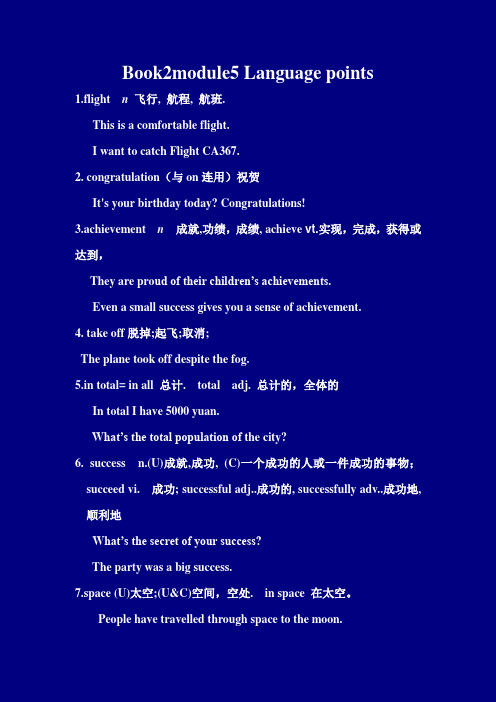
They are proud of their children’s achievements.
Even a small success gives you a sense of achievement.
4. take off脱掉;起飞;取消;
时间状语从句通常是由when, while, as来引导的。as作从属连词引导时间状语从句时,强调从句和主句的动作同时发生或进行。When引导时间状语从句,从句的动作可和主句的动词同时发生或进行,也可先于主句的动作。当表示两个动作同时发生时,可与as, while互换。while引导时间状语从句,从句的动词多表示持续性动作或状态,强调主从句的动作同时发生。as soon as可以引导表示“一……就……”。
8. aboard adv, prep在船(或飞机、火车、公共汽车)上(里).注意:abroad国外,在国外. go abroad出国。
He was already aboard the plane.
9. believe相信;认为,想。believe in=trust信任,信仰;believe sb.相信某人的话。believe in sb信任(信赖)某人
She is usually the first person to arrive at the school every day.
15. Lu, whose parents were born in China, spoke to Yang in Chinese during his flight.
whose在定语从句中作定语,它引导的定语从句的先行词可以是人,也可以是物.
高中英语必修5(外研版)Unit-1-British-and-American-English--知识点总结

高中英语必修5(外研版)Unit 1 British and American English知识点总结一、重点词汇·原文再现We have really everything in common with America nowadays,except of course,language. 当然,除了语言外,如今我们确实在所有方面都和美国一样。
·基本用法have...in common 在...有共同之处(宾语可以sth./nothing/little/a little/ a lot/much等)Though they are twins,they have nothing in common. 虽然是双胞胎,他们却毫无共同之处。
To my surprise,I found I had a lot in common with this stranger.令我吃惊的是,我发现自己和这个陌生人有许多共同点。
·知识拓展相关短语1. in common with sb./sth. 与……一样In common with other students, Tom is often late for school. 和其他学生一样,汤姆也经常迟到。
2. common people 平民百姓3. common sense 常识词义辨析: common/ordinary/usual/normal1. common 常见的,尤其指许多人或事物所共同具备的。
Rabbits and foxes are common in Britain. 兔子和狐狸在英国很常见。
2. ordinary 普通的,指平常的,平淡无奇的。
It was a very ordinary day today. 今天是很平常的一天。
3. usual 多指习惯性的、遵循常规的、一贯如此的。
I'm afraid I overslept and missed my usual bus.很遗憾我睡过头了,误了我通常坐的那班公共汽车。
高二英语外研版必修五知识点wear off

高二英语外研版必修五知识点wear off高二英语外研版必修五知识点:wear offWear off is a commonly used phrasal verb in English that describes the process of gradually losing effectiveness or faded appearance over time. In this article, we will explore the meaning of wear off, its usage in different contexts, and provide some examples to illustrate its usage.Meaning of "Wear Off"Wear off means to gradually diminish or disappear, usually referring to the loss of a certain quality or effect over time. It can relate to physical objects, such as the fading of colors or the eroding of materials, or it can refer to the decrease of a particular feeling or effect. The phrase implies that the original state is no longer as apparent or intense as before.Usage in Different Contexts1. Physical Objects:When we talk about the wear off of physical objects, it often refers to the gradual deterioration of appearance or quality. For example, the paint on a wall may wear off over time due to exposure to sunlight. Similarly, the color of clothes may fade after several washes, thereby wearing off the vibrant hue.2. Medication or Effect:The phrase wear off is frequently used in the context of medication or certain effects. When we take painkillers or sedatives, for instance, the initial relief tends to wear off after a certain amount of time, requiring another dose to maintain the desired effect. This can also apply to recreational drugs or alcohol, where the intoxication gradually wears off as the substances are metabolized by the body.3. Emotional or Psychological States:Wear off can also describe the diminishing of emotional or psychological states. For example, the initial excitement or happiness of achieving a goal may wear off after a while, leading to a sense of emptiness or dissatisfaction. Similarly, the enthusiasm for a new hobby or interest may wear off as time goes by, causing a loss of interest or motivation.Examples1. The effects of the painkiller started to wear off after two hours, and she needed to take another dose to alleviate her discomfort.2. The vibrant colors of the painting have gradually worn off due to exposure to sunlight over the years.3. His initial fears about the exam began to wear off as he gained confidence through thorough preparation.4. The excitement of the new job offer wore off quickly once she realized the long hours and demanding workload.5. The intensity of their relationship started to wear off after a few months, leading to indifference and eventually a breakup.In conclusion, wear off is a versatile phrasal verb that can be used to describe the gradual loss of effectiveness, appearance, or emotional impact over time. It finds application in various contexts, including physical objects, medication or effects, as well as emotional or psychological states. Understanding the meaning and usage of wear off can greatly enhance one's English language skills and comprehension.。
(推荐)高中英语外研版必修二Unit5重点单词词组语法要点
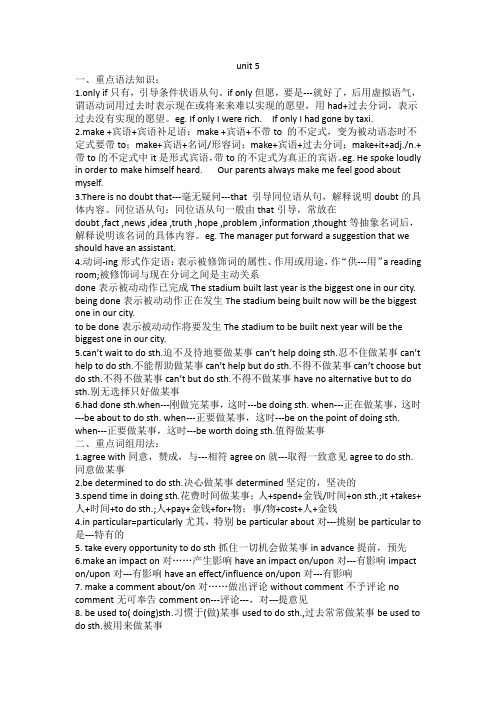
unit 5一、重点语法知识:1.only if只有,引导条件状语从句。
if only但愿,要是---就好了,后用虚拟语气,谓语动词用过去时表示现在或将来来难以实现的愿望,用had+过去分词,表示过去没有实现的愿望。
eg. If only I were rich. If only I had gone by taxi.2.make +宾语+宾语补足语:make +宾语+不带to 的不定式,变为被动语态时不定式要带to;make+宾语+名词/形容词;make+宾语+过去分词;make+it+adj./n.+带to的不定式中it是形式宾语,带to的不定式为真正的宾语。
eg. He spoke loudly in order to make himself heard. Our parents always make me feel good about myself.3.There is no doubt that---毫无疑问---that 引导同位语从句,解释说明doubt的具体内容。
同位语从句:同位语从句一般由that引导,常放在doubt ,fact ,news ,idea ,truth ,hope ,problem ,information ,thought等抽象名词后,解释说明该名词的具体内容。
eg. The manager put forward a suggestion that we should have an assistant.4.动词-ing形式作定语:表示被修饰词的属性、作用或用途,作“供---用”a reading room;被修饰词与现在分词之间是主动关系done表示被动动作已完成The stadium built last year is the biggest one in our city. being done表示被动动作正在发生The stadium being built now will be the biggest one in our city.to be done表示被动动作将要发生The stadium to be built next year will be the biggest one in our city.5.can’t wait to do sth.迫不及待地要做某事can’t help doing sth.忍不住做某事can’t help to do sth.不能帮助做某事can’t help but do sth.不得不做某事can’t choose but do sth.不得不做某事can’t but do sth.不得不做某事have no alternative but to do sth.别无选择只好做某事6.had done sth.when---刚做完某事,这时---be doing sth. when---正在做某事,这时---be about to do sth. when---正要做某事,这时---be on the point of doing sth. when---正要做某事,这时---be worth doing sth.值得做某事二、重点词组用法:1.agree with同意,赞成,与---相符agree on就---取得一致意见agree to do sth.同意做某事2.be determined to do sth.决心做某事determined坚定的,坚决的3.spend time in doing sth.花费时间做某事;人+spend+金钱/时间+on sth.;It +takes+人+时间+to do sth.;人+pay+金钱+for+物;事/物+cost+人+金钱4.in particular=particularly尤其,特别be particular about对---挑剔be particular to 是---特有的5. take every opportunity to do sth抓住一切机会做某事in advance提前,预先6.make an impact on对……产生影响have an impact on/upon对---有影响impact on/upon对---有影响have an effect/influence on/upon对---有影响7. make a comment about/on对……做出评论without comment不予评论no comment无可奉告comment on---评论---,对---提意见8. be used to( doing)sth.习惯于(做)某事used to do sth.,过去常常做某事be used to do sth.被用来做某事9. become/be familiar with熟悉…10. over time随着时间的推移,渐渐地,慢慢地(多与完成时连用)all the time 一直from time to time偶尔,有时in no time立即,马上at the same time同时11.When it comes to一谈到---就---而论come up to达到(标准)比得上come on 赶快,加油come about发生,产生come across偶然碰见,偶然发现come to共计,达到,苏醒come over来访,拜访come out出现,出版,开花come up with 提出,想出12.for the first time第一次the first/second ---time第一、二次every/the last/the next time每次、上次、下次the moment/minute/second一---就---immediately/instantly/directly一---就---at the moment目前13.make it及时到达,取得成功manage to do sth.设法做成某事share---with---与---分享pick up捡起,学会,收听,接收,接某人get lost迷路14.cheer up高兴起来,振作起来cheer on为---加油get mad生气15.keep in touch with保持联系stay in touch with保持联系get in touch with取得联系lose touch with失去联系be in touch with有联系be out of touch with失去联系16.fall apart破裂,崩溃fall behind落后fall off掉下fall down摔倒,失败17.at that此外,而且less than少于no less than不少于,多达(强调多)not less tha不少于,至少(强调最低限度)18.regard.as..认为,把……当作come true(愿望、梦想等)实现,成为现实三、重点单词学习:1.destination目的地,终点2.aware意识到的,知道的be/become aware of/that.---知道,意识到as far as I’m aware据我所知raise the awareness of---提高---的意识arouse one’s awareness of---唤起某人对---的意识3.quit离开,离任;停止,戒掉quit doing sth.停止做坏事或令人厌烦的事4.previous以前的,先前的previous to在---以前senior to比---级别高的junior to 比---级别低的inferior to比---差的superior to比---好的5.engage参与,参加engage in参加(活动)engage with---与---建立密切联系engage sb.’s interest/attention吸引某人的注意6.fantastic极好的7.mass大量,许多a mass of/masses of大量,许多8.typical典型的,有代表性的anyway无论如何,即便如此9.extremely adv极度;极其10.unique adj.独一无二的;仅有的11.admire v.欣赏12.quest (长期的)寻求探索,追求单词测验unit 5destination---------------- indigenous------------------------ 寻求,探索------------- 离开---------------------- profession------------------ previous------------------- route----------------------- dramatic--------------------- budget---------------------- transfer----------------- 偏僻的,偏远的-------------- 参与,参加-------------- mass--------------------- cash-------------------- credit card-----------------。
外研版英语必修五重点短语、语法汇总
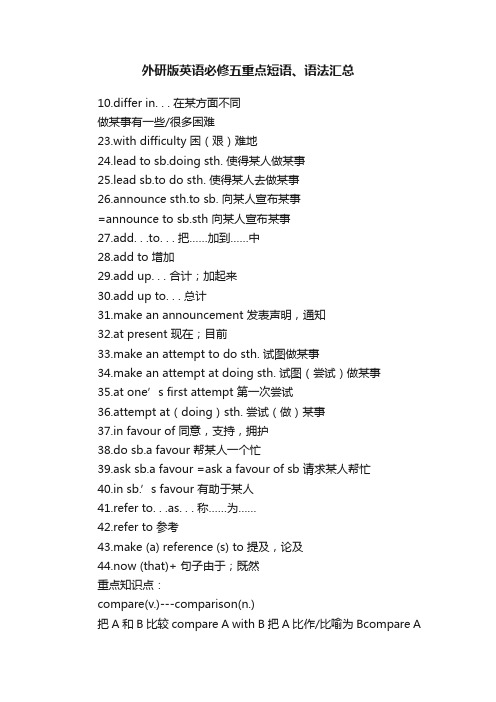
外研版英语必修五重点短语、语法汇总10.differ in. . . 在某方面不同做某事有一些/很多困难23.with difficulty 困(艰)难地24.lead to sb.doing sth. 使得某人做某事25.lead sb.to do sth. 使得某人去做某事26.announce sth.to sb. 向某人宣布某事=announce to sb.sth 向某人宣布某事27.add. . .to. . . 把……加到……中28.add to 增加29.add up. . . 合计;加起来30.add up to. . . 总计31.make an announcement 发表声明,通知32.at present 现在;目前33.make an attempt to do sth. 试图做某事34.make an attempt at doing sth. 试图(尝试)做某事35.at one’s f irst attempt 第一次尝试36.attempt at(doing)sth. 尝试(做)某事37.in favour of 同意,支持,拥护38.do sb.a favour 帮某人一个忙39.ask sb.a favour =ask a favour of sb 请求某人帮忙40.in sb.’s favour 有助于某人41.refer to. . .as. . . 称……为……42.refer to 参考43.make (a) reference (s) to 提及,论及44.now (that)+ 句子由于;既然重点知识点:compare(v.)---comparison(n.)把A和B比较compare A with B把A比作/比喻为Bcompare Ato B比起…,与…相比(作状语)compared with /to比得上compare with无与伦比beyond comparison与…比较in comparison相比之下by comparison differ(vi)different(adj.)difference(n.) 在…方面不同differin= be differentin区分…和…Tell the difference between…and..不同于differfrom= be differentfrom和某人在…方面differ with sb. on sth.有影响,使不同make a difference对…有影响have an effect on=have an influence on =affect =influenceItmakes a big differenceto your lifewhetheryou take an optimistic attitudeor not.你是否采取乐观的态度对你的人生有很大的影响。
外研版高二英语必修五 重难点句归纳
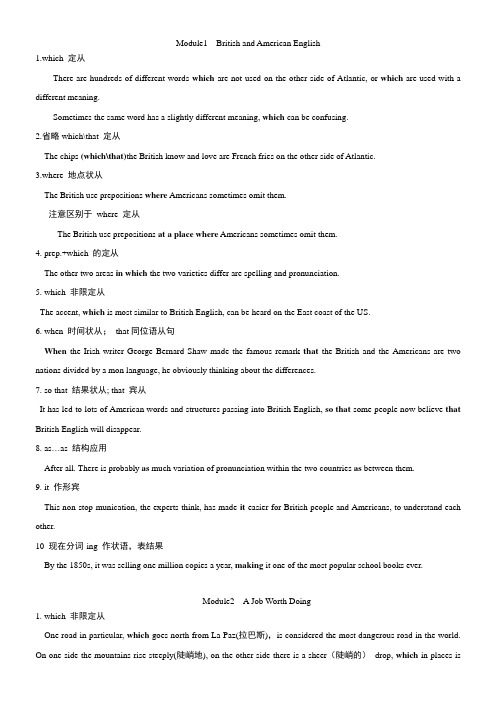
Module1 British and American English1.which 定从There are hundreds of different words which are not used on the other side of Atlantic, or which are used with a different meaning.Sometimes the same word has a slightly different meaning, which can be confusing.2.省略which\that 定从The chips (which\that)the British know and love are French fries on the other side of Atlantic.3.where 地点状从The British use prepositions where Americans sometimes omit them.注意区别于where 定从The British use prepositions at a place where Americans sometimes omit them.4. prep.+which 的定从The other two areas in which the two varieties differ are spelling and pronunciation.5. which 非限定从The accent, which is most similar to British English, can be heard on the East coast of the US.6. when 时间状从;that同位语从句When the Irish writer George Bernard Shaw made the famous remark that the British and the Americans are two nations divided by a mon language, he obviously thinking about the differences.7. so that 结果状从; that 宾从It has led to lots of American words and structures passing into British English, so that some people now believe that British English will disappear.8. as…as 结构应用After all. There is probably as much variation of pronunciation within the two countries as between them.9. it 作形宾This non-stop munication, the experts think, has made it easier for British people and Americans, to understand each other.10 现在分词-ing 作状语,表结果By the 1850s, it was selling one million copies a year, making it one of the most popular school books ever.Module2 A Job Worth Doing1. which 非限定从One road in particular, which goes north from La Paz(拉巴斯),is considered the most dangerous road in the world. On one side the mountains rise steeply(陡峭地), on the other side there is a sheer(陡峭的)drop, which in places ishundreds meters deep.2. so…that..结果状从The drop is so great that anyone inside the vehicle is lucky to survive.3. who 定从,过去分词-ed作后定Apaza is a gentle 46-year-old man who lives in a village near the most dangerous part of the road, known locally as the Devil’s Bend(魔鬼弯道).4. when 时间状从When two vehicles approach from the opposite directions they can’t see each other, but they can see him.5. so that 目的状从Sometimes drivers give him a tip, so that he has just enough money to live on.6. 现在分词-ing 作状语,表伴随Often they just passed by, taking the human traffic signal for granted.7. 过去完成时had done,时间对比性的体现Before he volunteered to direct the traffic, he had had lots of jobs.8. 被动语态be done,which定从,过去完成时had doneA few years later, he was called out in the night to help pull people out of a bus which had crashed at the Devil’s Bend.9. that 宾从,it形主He realized that he was lucky to be alive himself, and felt that it was his mission in life to help others.10. 将来进行时will be doing, 过去分词-ed做后置定语What sort of jobs will people be doing ten years from now? According to a survey published by an American university, the ten fastest growing jobs will be related to puters and health.11. as 原因状从, 将来时的被动will be doneAs more and more countries open up to tourism, more travel agents will be needed, but the real demand will be for guides to take groups and even individuals on adventure holidays.Module3 Adventure in Literature and Cinema1.现在分词-ing,作伴随状语So we paddled over and climbed on to the steamboat, keeping as quiet as mice.2.不定代词(something, nothing, anything….)做先行词,后面的定从只能用that引导The other was tall and had something in his hand that looked like a gun.3.who 引导定从He was obviously the one who had threatened the man on the floor.4.what 宾从, and 连接三个位于动词I crawled along the deck, found Jim, and told him what I had heard.5.过去分词-ed,做后置定语We found the men’s boat tied to the other side of the steamboat.6.as 引导时间状从As we paddled away we heard the two men shouting.7. what 宾从, 过去完成时had doneNow I began to feel bad about what we had done.8.省略who 的定从Often the lives of writers resemble the lives of the characters they create.9. only to do 常表意想不到的结果, that宾从He arrived in New Orleans(新奥尔良)without a penny in his pocket only to find that there were no boats for South America.10.过去分词-ed做原因状语,有被动含义;现在分词-ing做伴随状语;which 定从Forced to change his plans, he worked for several days as a pilot on a steamboat, taking passengers up and down the Mississipi(密西西比河),the great river which follows from the north of the US near the Canadian border(加拿大边境), down to the Gulf of Mexico(墨西哥湾).Module4 Carnival1. where非限定从,as 时间状从In Europe, where it began, carnival was followed by forty days without meat, as people prepared for the Christian festival of Easter(基督教的节日—复活节).2.现在分词-ing作主语,宾语Having fun meant eating, drinking and dressing up.3.as时间状从,so that结果状从,被动语态be doneAs time passed, however, the carnival period was extended, so that it began just after Christmas.4.现在分词-ing作伴随状语,what宾从, 被动语态be doneFor weeks on end people walked round the streets wearing masks, doing what they wanted without being recognized.5.while表转折Ordinary people could pretend to be rich and important, while famous people could have romantic adventures in secret.6.that宾从; 现在分词-ing作主语; 过去完成时had done; 被动语态be done; which 非限定从The government realized that wearing masks had bee a problem. Their use was limited by laws, the first of which dates back to the14th century.7.if 条件状从,被动语态be doneIf they broke the laws, they were put into prison for up to 2years.8. as 时间状从。
高中英语新外研版必修二U5 On the road 知识点
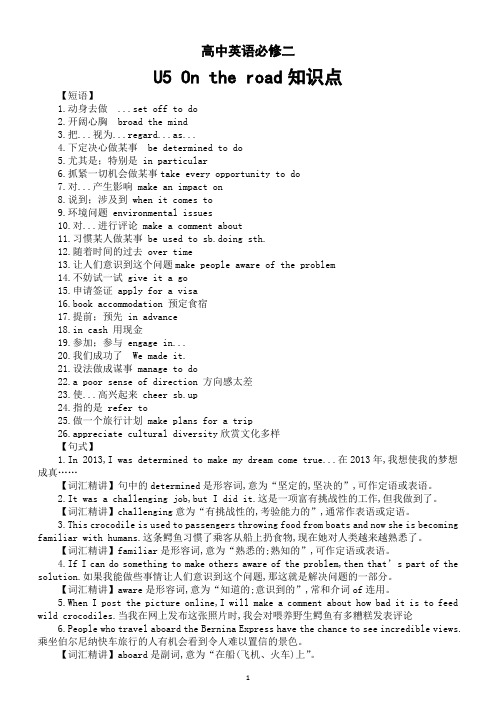
高中英语必修二U5 On the road知识点【短语】1.动身去做 ...set off to do2.开阔心胸 broad the mind3.把...视为...regard...as...4.下定决心做某事 be determined to do5.尤其是;特别是 in particular6.抓紧一切机会做某事take every opportunity to do7.对...产生影响 make an impact on8.说到;涉及到 when it comes to9.环境问题 environmental issues10.对...进行评论 make a comment about11.习惯某人做某事 be used to sb.doing sth.12.随着时间的过去 over time13.让人们意识到这个问题make people aware of the problem14.不妨试一试 give it a go15.申请签证 apply for a visa16.book accommodation 预定食宿17.提前;预先 in advance18.in cash 用现金19.参加;参与 engage in...20.我们成功了 We made it.21.设法做成谋事 manage to do22.a poor sense of direction 方向感太差23.使...高兴起来 cheer sb.up24.指的是 refer to25.做一个旅行计划 make plans for a trip26.appreciate cultural diversity欣赏文化多样【句式】1.In 2013,I was determined to make my dream come true...在2013年,我想使我的梦想成真……【词汇精讲】句中的determined是形容词,意为“坚定的,坚决的”,可作定语或表语。
- 1、下载文档前请自行甄别文档内容的完整性,平台不提供额外的编辑、内容补充、找答案等附加服务。
- 2、"仅部分预览"的文档,不可在线预览部分如存在完整性等问题,可反馈申请退款(可完整预览的文档不适用该条件!)。
- 3、如文档侵犯您的权益,请联系客服反馈,我们会尽快为您处理(人工客服工作时间:9:00-18:30)。
高二必修五知识点梳理Module 1 British and American English重点词汇:accent , obvious, queue, confusing, compare, variety, remark, variationsteadily, switch, satellite, structure,重点短语1.have in common有共同点2.make a difference有影响;使不同3.get around四处走走pare with/to和……比较5.differ from与……不同6.be similar to与…..不同7.have difficulty in doing sth.做某事有困难8.lead to导致9.have sth. in common(与某人)兴趣、想法相同长难句解析1.This non-stop communication,the experts think,has made it easier forBritish people and Americans to understand each other.专家认为,这种不间断的交流使英美人之间的相互理解变得更容易。
当不定式、动名词或从句在复合宾语结构中作某些动词的宾语时(如make,find,see,hear 等),为保持句子平衡,常用 it作形式宾语,而将真正的宾语放在句尾。
其结构为:主语+谓语动词+ it +形容词/名词/代词+不定式/动名词/从句。
it 后面的形容词或名词作宾补。
2. When the Irish writer George Bernard Shaw made the famous remark that the British and the Americans are two nations divided by a common language, he was obviously thinking about the differences.当著名的爱尔兰作家萧伯纳说出“英国和美国是被一种常见的语言分割开来的两个国家”一番话时,很明显他考虑了两者之间的差异。
that the British and the Americans are two nations divided by a common language 是同位语从句,用来说明前面的名词 remark 的容。
语法通关一、一般现在时1.表示现在习惯或经常反复发生的动作或存在的状态,常与usually,always,sometimes,often,frequently,every day/week/year/morning...on Sunday等时间状语连用。
二、现在进行时1.表示现在(说话瞬间)正在进行或发生的动作。
2.表示说话人现在对主语的行为表赞叹或厌恶等3. 表示当前一段时间的活动或现阶段正在进行的动作。
(说话时动作不一定正在进行)三、现在完成时1.表示过去发生或已经完成的某一动作对现在造成的影响或结果。
2.表示过去已经开始,持续到现在的动作或状态。
可以和表示从过去某一时刻延续到现在(包括“现在”在)的一段时间的状语连用四、一般将来时表示将来发生的动作或存在的状态,常与soon,tomorrow(morning...),next week/year...,some day,from now on,the day after tomorrow,in (the) future 等表示将来的时间状语连用。
Module 2 A Job Worth Doing重点词汇:satisfying, stressful, volunteer, respect, direct, encounter, profound, qualified重点短语1.in particular尤其;特别2.on average平均e off掉离;脱离4.in theory理论上;从理论上讲5.in practice实际上6.have an effect on对……产生影响7.take up从事;占据(时间、空间)8.pass by路过;经过9.take for granted认为……理所当然长难句解析1. Every morning he climbs up to the bend with a large circular board in his hand.每天早晨,他手里都拿着一个大圆板爬上弯道。
此句中的with a large circular board in his hand 是with 复合结构的一种形式:with+宾语+介词短语,在句中作状语,表状态。
除介词短语作宾补外,还可以用形容词,副词,过去分词,现在分词,动词不定式。
2. He was driving a lorry load of bananas when he came off the road at a bend and fell three hundred meters down the mountain. 当他正开着装满香蕉的卡车要驶过一个弯道的时候,他连人带车翻到了300 多米深的山崖下。
本句中的when为并列连词,表示就在那时的意思,相当于and at that time , be doing...when...的意思为“正在……这时……”。
3. I was told that there were about 50 foreign students studying Chinese in the school,most of whom were from Germany.他们告诉我这所学校里有50名外国学生学习汉语,大多数来自德国。
本句中some of which引导的是非限制性定语从句,是介词+“关系代词”结构,表示“人”,关系代词用whom,表示“物”,关系代词用which。
在这种情况下,不能使用人称代词。
语法通关一般过去时1.表示在确定的过去时间发生的动作或状态。
2.表示过去经常发生的动作或习惯性动作3.描述几个相继发生的过去动作4.有时动词的一般过去时形式上为过去,而实际上却指现在,即“原来想的”与现在的实际情况不相符。
过去进行时1.表示过去某一时刻正在进行的动作。
2.表示过去一段时间正在进行的动作。
3.表示从过去某一时间的角度看将要发生的4.表示礼貌,并不表示过去的时间,而表达现在的客气或礼貌。
三、过去完成时1.表示在过去某一具体时间或动作之前已经完成的动作,常用 by,before 等介词短语或状语从句表示。
2.表示过去某一时间以前的经历,常与 for,since 引导的表示过去的时间状语连用。
Module 3 Adventure in Literature and the Cinema重点词汇:Biography, fantasy, account, companion, lie, panic, curious, tie, frightterrified, adventure, thriller, horror重点短语1.have no connection与…..无关2.run away逃跑3.ahead of在…..前面;提前4.pour down倾盆而下5.to one’s surprise使某人惊奇的是6.be curious about对……感到好奇7.have enough of听够、看够、吃够、受够8.die of fright惊吓而死9.run into偶然遇到10.in a panic惊恐的长难句解析1. But I persuaded him to help me,and we found the men’s boat tied to the other side of the steamboat.但我还是说服他帮我,我们发现那两人的船就紧贴在汽艇的另一边。
本句中的tied to the other side of the steamboat为过去分词短语作宾语补足语,和宾语the men’s boat之间存在逻辑动宾关系。
动词不定式、v.-ing形式和过去分词都可以用作宾语补足语。
2. He arrived in New Orleans without a penny in his pocket only to find that there were no boats for South America.他身无分文地到达新奥尔良时,却发现那里没有开往南美洲的船了。
本句中的only to find that there were no boats for South America 为动词不定式短语作结果状语。
表示“意外的,意想不到的”的结果,而v.-ing作状语,表示“自然而然”的结果。
不定式常用作目的状语,相当于in order to do 形式的用法。
语法通关一、非谓语动词非谓语动词是动词的非谓语形式。
它们不能在句中充当谓语,可充当其他语法功能,可以起名词、形容词或副词的作用,在句子中充当主语、宾语、表语、定语、补语和状语。
1.非谓语动词作主语2.非谓语动词作表语3.非谓语动词作宾语4.非谓语动词作宾语补足语、主语补足语5.非谓语动词作定语6.非谓语动词作状语Module 4 Carnival重点词汇:confusion, extend, revive, elegant, magic, memory, pretend, wandercalendar, atmosphere, abolish重点短语e to an end完结2.dress up装扮;化妆3.have fun玩的愉快4.on end连续的5.date back to追溯到6.in secret秘密的7.in memory of为了纪念…..8.pass on传递e off脱落长难句解析1. As time goes on,it’s getting warmer and warmer.随着时间的推移,天气变得越来越暖和了。
句中as引导时间状语从句,表示“随着”的意思,表示主句和从句的谓语动词的动作同时发生。
该状语从句也可以用with time passing替换。
2. ...they painted their faces white,imitating their masters and making fun of them.……他们把脸涂白,模仿他们的主人来取笑他们。
本句中imitating their masters and making fun of them为v.ing形式做伴随状语。
